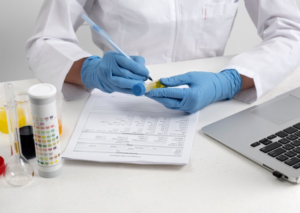Role of DNA Testing in Family-Based Immigration Cases

Family-based immigration cases can fail to prove biological links, particularly in circumstances where documentation evidence is lacking or insufficient. DNA testing for immigration has evolved into an essential instrument for verifying family ties, guaranteeing accuracy and openness in immigration processes. This article provides a thorough summary of how USCIS DNA testing operates, what the procedure consists of, and when immigration authorities seek these tests. This guide will walk you through every step and requirement involved, whether your application is for a visa, sponsorship of a relative, or addressing missing documentation.
What is DNA Testing for Immigration?
Scientifically, DNA testing immigration is the method used to confirm biological ties between people. For family-based immigration cases, generally involves parents, children, or siblings who must demonstrate their genetic ties to meet eligibility requirements. Though it’s usually the final option, USCIS DNA testing becomes crucial when birth certificates or other legal documentation are absent, incomplete, or disputed.
When is DNA Testing Required for Immigration?
Candidate immigrants might ask, “Is a DNA test required for immigration USA?” Although not required in every case, immigration DNA testing is usually sought under particular conditions:
- Insufficient or Inconsistent Documentation: If the given birth certificates, marriage records, etc., prove insufficient or show inconsistencies.
- Fraud Prevention Measures: Sometimes the USCIS may need DNA testing to rule out fraudulent applications containing false familial claims.
- Sibling Sponsorship Applications: Especially when parents’ records are lacking, Sibling DNA testing is often necessary to prove a biological relationship.
- Adoption or Reunification Cases: In circumstances where children were adopted or separated from their parents during migration, DNA testing for immigration provides conclusive evidence for family reunification.
If the question arises, “Can immigration ask for a DNA test?” – the answer is yes. The USCIS can require DNA testing immigration as part of their judgment procedure.
How to Get Started with USCIS DNA Testing

When the USCIS DNA testing centers propose a DNA test, following the required processes ensures the findings are authentic. Here’s a step-by-step guide:
- Receiving the DNA Test Request: The USCIS or the U.S. embassy/consulate will notify the applicant about the need for a DNA test. They will provide instructions on approved DNA tests for immigration USA
- Selecting an Accredited DNA Testing Center: Choose a DNA testing center near you that is accredited by the AABB (American Association of Blood Banks), as only results from these labs are accepted by the USCIS.
- Scheduling the Appointment: Contact the testing center to make an appointment. If you are looking for a sibling DNA test or immigration DNA testing near you, make sure the center can do the particular kind of test required.
- Method of Sampling: Samples are taken with a painless cheek swab from the petitioner and the beneficiary. If one party is outside the United States, their sample will be gathered at a designated U.S. embassy or consulate. The lab will then securely mail the samples to guarantee integrity.
- Receiving and Submitting Results: The lab forwards the results straight to the seeking embassy, or USCIS after the testing is finished. The applicant will receive a copy for their records.
USCIS Approach to DNA Evidence
To guarantee the integrity of the DNA testing process, the USCIS uses strict policies. Requests for a DNA test must be made from AABB-accredited labs, guaranteeing the accuracy of the test findings. Immigration DNA tests should be considered a backup only when main documentation is lacking or under doubt. This rule guarantees that the procedure remains open and fair for every candidate.
Maintaining the quality and chain of custody for DNA samples depends significantly on USCIS DNA testing centers. These facilities operate under strict rules to ensure that every sample is treated carefully and remains free of contamination. To meet USCIS criteria, candidates should only choose recognized centers—either locally or overseas. Using an unauthorized lab risks delays or even the rejection of test results.
Sibling DNA Tests: Proving Family Relationships Beyond Parents and Children

A sibling DNA testing center becomes crucial for candidates wishing to sponsor siblings in cases when family records or birth certificates are not accessible. This is particularly common in areas where birth registrations are not properly enforced. A sibling DNA test is essential because it satisfies immigration officials that a legal family link exists by proving a shared biological parentage between two siblings.
The technique is far more accessible now that sibling DNA test near you services are available. Families can quickly schedule visits and submit samples with several AABB-accredited labs spread across the United States. The collection process can be arranged for candidates from outside the United States using U.S. embassies or consulates. This ensures that families anywhere can meet USCIS standards.
Advice for Ensuring a Flawless DNA Testing Procedure
- Select a Certified Lab: Only AABB-accredited labs are approved; avoid using unapproved facilities.
- Plan for International Coordination: If a relative lives overseas, work with the embassy to coordinate testing dates.
- Maintain Updated Records: Share correct contact information and track correspondence from the DNA test centers near you or the embassy.
- Check Before Sending: Verify that the DNA test application is accurately completed; mistakes could cause delays.
- Avoid Delays by Acting Quickly: Upon notification, schedule the test right away to avoid any processing delays with your case.
How Much Does DNA Testing for Immigration Cost?
The cost of DNA testing for immigration depends on location and the number of participants. Typically, one DNA test for immigration USA runs between $400 and $800 per person. Fees include processing, shipping, and sample collection. If testing requires international participation, additional shipping charges may be involved.
Finding the Right DNA Testing Center Near You

It is imperative to select a DNA test center near you that is AABB-accredited. Especially if you are sponsoring a sibling, many trustworthy facilities provide sibling DNA testing near you services. USCIS DNA testing labs ensure legal standard compliance to prevent illegal activity.
How DNA Testing Influences the Outcome of Immigration Cases
Eliminating uncertainty and verifying ties helps DNA immigration significantly accelerate family reunion procedures. Usually, favorable results from DNA tests for immigration lead to instant clearance. However, if tests fail to establish a biological link, the applicant might have to seek alternative immigration routes.
In Summary
DNA testing for immigration has evolved into a necessary component of family-based immigration proceedings because it offers authenticity and clarity where documentation falls short. For anyone who is asking about “When is DNA required for immigration?” — while not always necessary, it provides a consistent answer in cases of insufficient documentation. Through foreign embassy networks or DNA testing immigration, families have the chance to reunite under legal immigration policies.
Call to Action
Visit Passage Law if you are navigating family-based immigration issues and require trustworthy advice. Our knowledgeable lawyers will walk you through the process, ensuring you comply with USCIS DNA testing criteria and helping you find the right DNA testing center near you. Allow us to assist you in achieving a successful and seamless family reunion.
Covering all required actions, processes, and legal criteria, this article provides a thorough understanding of DNA testing for immigration. Working with Passage Law guarantees seamless administration of your immigration DNA test, eliminating delays and enabling families to reunite through legal immigration routes.
